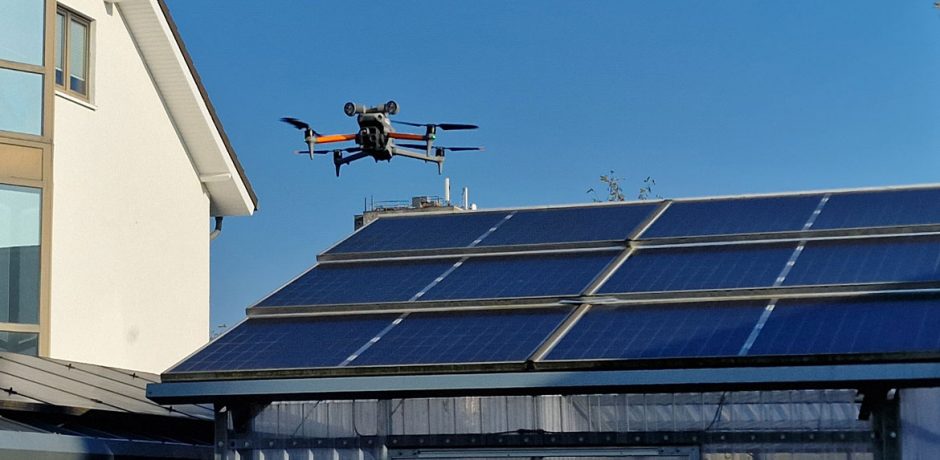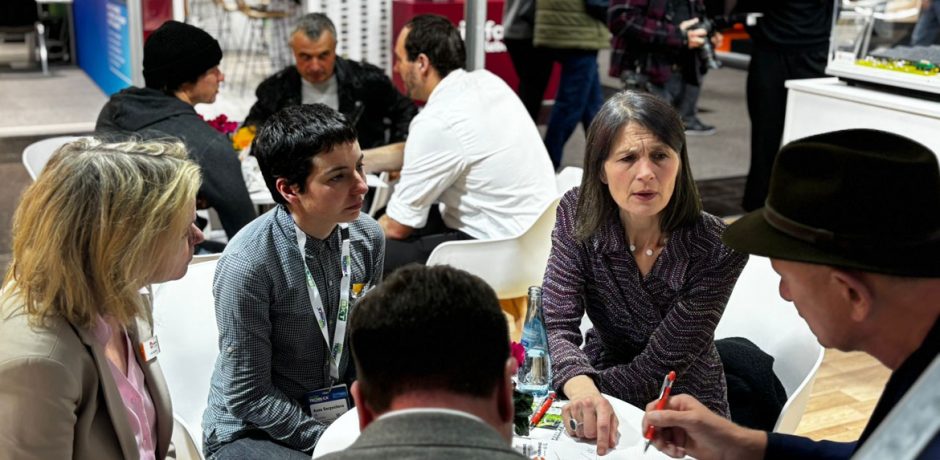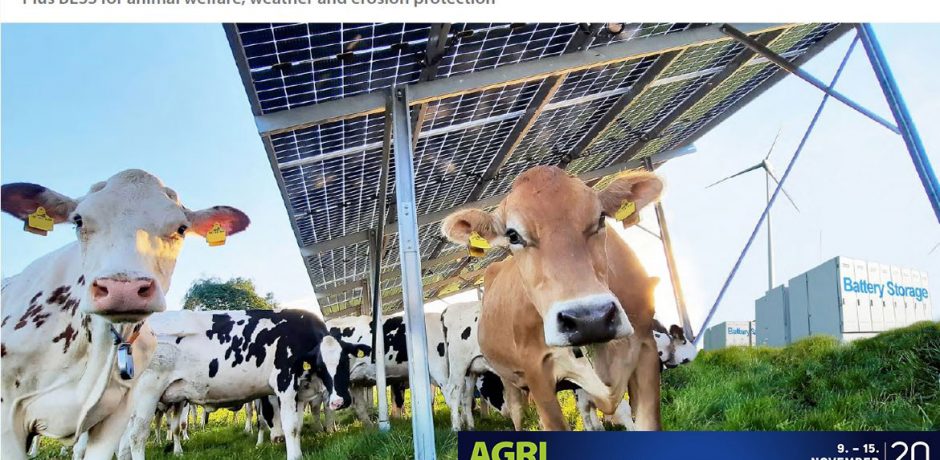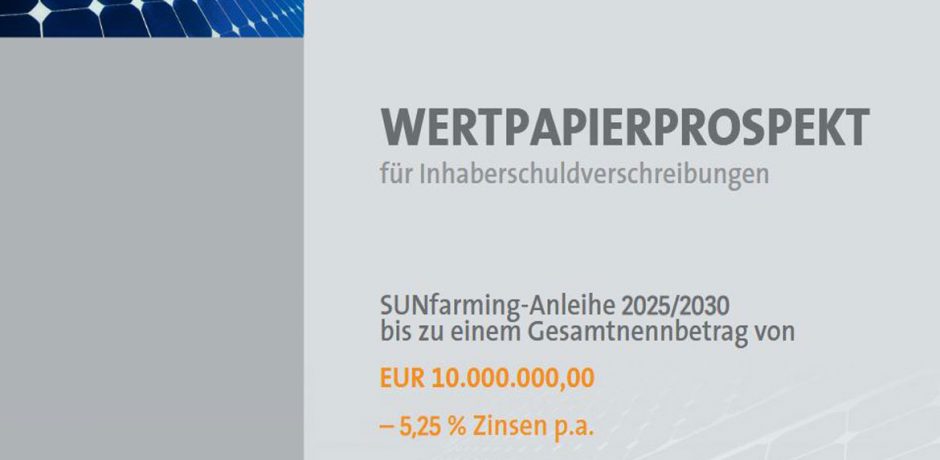Happy New Year!
We look back on a special year in 2025.
The successful integration of SUNfarming into the Cube Green Energy Group enables us to continue to master the growing challenges of the energy transition with a strong partner at our side in the future. A clear focus remains on the project development and implementation of Agri-Solar systems, which combine the sustainable multiple use of agricultural land for energy and food production. In partnership with Cube Green Energy, we now also cover the development of battery storage and wind projects, enabling us to take a more holistic approach to the market.
We would like to thank you for the trusting cooperation we have enjoyed so far and look forward to implementing the first large-scale Agri-Solar projects in 2026.
We wish you and your families a happy new year.
Your SUNfarming Team
17 MW of capacity for more clean energy in Warmia-Masuria
SUNfarming continues the successful expansion of its project portfolio:
In the third quarter of 2025, a total of 14 new photovoltaic systems with a total capacity of 17 megawatts (MW) were completed in the Polish province of Warmia-Masuria.
Four plants are already successfully feeding electricity into the public grid, while the remaining sites are in the acceptance and commissioning phase. All projects were implemented on schedule and meet the current technological and safety standards for modern solar parks.
Sustainable contribution to the regional energy transition
The new plants are making an important contribution to the decarbonization of the energy supply in northeastern Poland. By feeding into local power grids, the share of renewable energy in the region is being further increased — reducing annual CO₂ emissions by several thousand tons.In addition, the solar parks contribute to grid stabilization and security of supply in structurally weaker regions. Thanks to decentralized feed-in, the energy generated can be used directly on site – an important step toward strengthening rural economies and promoting the expansion of green infrastructure in Poland.
Part of a growing project pipeline
The projects in Warmia-Masuria are part of a comprehensive pipeline of over 300 MWp, currently at various stages of development and implementation in Poland. These investments reflect the company's commitment to consistently promoting the expansion of renewable energies in line with Poland's national energy and climate targets.
“With our projects in Poland, we are making a concrete contribution to the European energy transition – clean, economical, and sustainable,” explains Martin Tauschke, Managing Director of SUNfarming GmbH. “Our goal is to supply regions with clean electricity while strengthening local structures.”
Clean energy, real impact
With each new solar park, SUNfarming consistently pursues its mission: to generate clean energy, promote regional value creation, and actively shape the future of sustainable energy supply.
Innovation from the Air
Erkner, October 2025 - SUNfarming Utilizes Drone Technology for Enhanced Efficiency and Planning
SUNfarming continues to invest in state-of-the-art technologies and in-house expertise. At the end of October, six employees successfully completed their training as certified remote pilots at U-ROB, marking another step in the company’s digitalization journey. At the same time, SUNfarming has put two new DJI Matrice 4T drones into operation, which will be deployed in both technical service and project development and planning.
Increased Efficiency in Plant Service
With the new drone systems, SUNfarming can now perform thermal analyses of photovoltaic and wind power plants directly on site. Thanks to high-precision sensor technology, defective modules, hotspots, or faulty connections can be identified quickly and reliably — eliminating the need for time-consuming manual inspections.
“Drone technology enables us to make maintenance and service operations much more efficient,” explains Max Walter, Head of Operations Management | Head of O&M. “We can detect anomalies at an early stage and remedy them in a targeted manner – this saves time and costs and ensures even more reliable plant operation.”
Drones as a Tool for Planning and Development
Beyond technical service, the DJI Matrice 4T drones will play a key role in project development. They will be used for surveying flights of land and assets, capturing high-resolution 3D images and geodata that enable more precise planning of plant layouts.
The combination of optical and thermal imaging creates detailed terrain models, helping to identify potential obstacles or topographical features early — adding real value to both site analysis and construction planning.
Innovation in Practice
With this investment, SUNfarming once again underscores its commitment to integrating innovation into practice – for greater efficiency, safety, and quality across all project phases.
“The integration of drone technology is another step toward making our processes more digital and data-driven,” emphasizes Walter. “This not only creates added value for our customers but also strengthens our internal expertise in smart maintenance and project planning.”
With its new drone program, SUNfarming is focusing on innovation from the air – enabling more precise analyses, more efficient processes, and sustainable progress in energy and agriculture.
Strong turnout at AGRITECHNICA 2025 – Great interest in SUNfarming’s Agri-PV solutions
At AGRITECHNICA 2025, SUNfarming’s booth drew strong interest from farmers, technology providers, and policymakers exploring practical applications of Agri-PV.
Numerous visitors engaged with our team to learn how SUNfarming systems enable dual land use—combining crop production with clean energy generation.
Discussions also highlighted how Agri-PV can integrate with other renewables like biogas, wind, and battery storage to strengthen regional energy resilience.
The overall feedback was clear: Agri-PV is moving from concept to reality, and SUNfarming continues to be recognized as a key innovation driver in sustainable agriculture.
Agri-photovoltaics: Agriculture and energy production grow together – SUNfarming at Agritechnica 2025
From November 9 to 15, 2025, SUNfarming will be presenting practical solutions and innovative systems related to the future-oriented topic of agri-photovoltaics (Agri-PV) at Agritechnica in Hanover, Hall 24, Booth C28.
The combination of agriculture and solar energy is considered a key technology for the sustainable transformation of the agricultural sector – and SUNfarming is one of the leading pioneers in this field.Efficient dual use: energy and yields from the same area
The great advantage of agri-PV lies in the simultaneous use of agricultural land for food production and energy generation. While the solar modules supply electricity, crops can be grown or animals kept underneath them. SUNfarming relies on flexible, modular systems that can be adapted to the needs of different crops and types of farming – from berries and medicinal plants to vegetable cultivation and animal husbandry.
“Our agri-PV systems offer protection from extreme weather conditions such as hail, heavy rain, and heat, while at the same time generating valuable green electricity,” explains Peter Schrum, founder of SUNfarming. “In this way, they not only contribute to climate protection, but also to the economic stability of agricultural businesses.”
Technological innovation: From rainwater management to robotics
At Agritechnica, SUNfarming will present the latest research results from its own Agri-PV Research and Innovation Center in Rathenow.
Here, various system designs, crops, and cultivation methods are tested under real conditions.
A key topic is the proven rainwater distribution system under the modules: Large-scale irrigation and the natural capillary action of the soil ensure even moisture distribution – a decisive factor for yield security and soil health.
Agri-robotics is also playing an increasingly important role: in Rathenow, autonomous robots for maintenance, irrigation, and harvesting are being tested in collaboration with start-ups. These technologies are intended to reduce the amount of work required while increasing precision in cultivation under PV systems.
New perspectives for animal husbandry and municipal energy supply
In addition to crop production, SUNfarming is also focusing on agri-PV in animal husbandry.
Covering outdoor areas with solar modules provides animals with shade and weather protection, improves animal welfare, and opens up additional sources of income for farms through electricity production.
n combination with biogas, wind power, and battery storage, sustainable energy concepts are created that can also contribute to municipal heat supply.
A current example is the Steinhöfel project, where SUNfarming is preparing to start construction of a large-scale agri-PV system in accordance with DIN SPEC 91434. With a planned output of 150 MWp, this is an important step towards a total of 2 GWp of installed agri-PV capacity by 2030.
SUNfarming at Agritechnica 2025
At Agritechnica, SUNfarming will present various model-scale agri-PV systems and current research results on crop production, animal husbandry, and combined energy production in Hall 24, Booth C28.
Visitors can obtain information directly from agri-PV experts about funding opportunities, technical solutions, and project development options.
Conclusion:
Agri-photovoltaics is much more than a new form of solar energy – it is a strategy for the future of agriculture, climate protection, and regional value creation.
With decades of experience and a clear focus on research and practice, SUNfarming stands for innovative, economical, and sustainable solutions that demonstrate that energy and agriculture belong together.
SUNfarming launches new 5-year corporate bond with 5.25% interest rate – Investing in the future of energy
Erkner, September 25, 2025 – SUNfarming GmbH, one of Germany's leading developers and operators of photovoltaic and energy storage projects, is entering its next phase of growth with a new corporate bond.
With the new 5.25% bond 2025/2030 (ISIN: DE000A4DFSB3), SUNfarming offers investors the opportunity to participate in the energy transition – securely, transparently, and with an eye to the future. The planned issue volume is up to €10 million, with a term of five years.
“With this new bond, we are continuing our solid financing model while creating new scope for further growth – particularly in the areas of agri-photovoltaics, energy storage, and project development,” explains Martin Tauschke, Management of SUNfarming.
Attractive exchange offer for existing investors
Investors in the current 5.5% bond 2020/2025 (ISIN: DE000A254UP9) can exchange their securities for the new bond 2025/2030 at a ratio of 1:1. In addition, accrued interest will be paid out. The exchange period runs from September 30 to October 23, 2025 (6 p.m.).
Public subscription possible from October 2025
The bond will be open for subscription to new investors from October 13, 2025. Interested investors can apply for participation using the subscription form available on the SUNfarming website (www.sunfarming.de/ir).
Sustainable use of funds – 100% energy transition
The proceeds from the issue will primarily be used to refinance the maturing 2020/2025 bond. In addition, funds will be specifically allocated to forward-looking solar and energy storage projects – from project development and component procurement to implementation.
“We invest in real assets with a direct impact – our projects deliver clean energy, secure agricultural incomes, and strengthen regional economic cycles,” Tauschke continues.
The securities prospectus approved by the CSSF and notified by BaFin is available at www.sunfarming.de/ir. Trading of the new bond on the Frankfurt Stock Exchange's Open Market is scheduled to begin on February 3, 2026.
Contact:
Karsten Balzer
SUNfarming GmbH
03362/8859-120
ir@sunfarming.de
Frank Ostermair, Linh Chung
Better Orange IR & HV AG
089/8896906-25
linh.chung@linkmarketservices.eu
By loading the map, you accept Google's privacy policy.
Learn more









